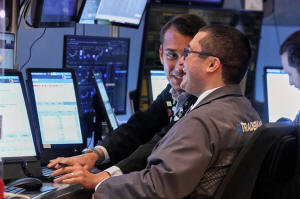Wall Street's winning week ends with more records for US stocks
[July 26, 2025] By
STAN CHOE
NEW YORK (AP) — U.S. stocks capped another strong week with more records
on Friday.
The S&P 500 rose 0.4% to set an all-time high, the fifth time it did so
this week. The Dow Jones Industrial Average climbed 208 points, or 0.5%,
and the Nasdaq composite added 0.2% to its own record set the day
before.
Deckers, the company behind Ugg boots and Hoka shoes, jumped 11.3% after
reporting stronger profit and revenue for the spring than analysts
expected. Its growth was particularly strong outside the United States,
where revenue soared nearly 50%.
Edwards Lifesciences rose 5.5% after likewise topping Wall Street’s
expectations for profit in the latest quarter. It said it saw strength
across all its product groups, and it expects profit for the full year
to come in at the high end of the forecasted range it had given earlier.
They helped offset a drop of 8.5% for Intel, which fell after reporting
a loss for the latest quarter, when analysts were looking for a profit.
The struggling chipmaker also said it would cut thousands of jobs and
eliminate other expenses as it tries to turn around its fortunes. Intel,
which helped launch Silicon Valley as the U.S. technology hub, has
fallen behind rivals like Nvidia and Advanced Micro Devices while demand
for artificial intelligence chips soars.
All told, the S&P 500 rose 25.29 points to 6,388.64. The Dow Jones
Industrial Average climbed 208.01 to 44,901.92, and the Nasdaq composite
added 50.36 to 21,108.32.
The pressure is on companies to deliver solid growth in profits in order
to justify big gains for their stock prices, which have rallied to
record after record in recent weeks. Wall Street has zoomed higher on
hopes that President Donald Trump will reach trade deals with other
countries that will lower his stiff proposed tariffs, along with the
risk that they could cause a recession and drive up inflation. Trump has
recently announced deals with Japan and the Philippines, and the next
big deadline is looming on Friday, Aug. 1.

Besides potential trade talks, next week will also feature a meeting by
the Federal Reserve on interest rates. Trump again on Thursday lobbied
the Fed to cut rates, which he has implied could save the U.S.
government money on its debt repayments.
Fed Chair Jerome Powell, though, has continued to insist he wants to
wait for more data about how Trump’s tariffs affect the economy and
inflation before the Fed makes its next move. Lower interest rates can
help goose the economy, but they can also give inflation more fuel.
[to top of second column] |

Traders Drew Cohen, foreground, and Dylan Halvorsan work on the
floor of the New York Stock Exchange, Monday, July 21, 2025. (AP
Photo/Richard Drew)

Lower rates also may not lower the U.S. government’s costs to borrow
money, if the bond market feels they could send inflation higher in the
future. In that case, lower short-term rates brought by the Fed could
actually have the opposite effect and make it more expensive for
Washington to borrow money over the long term.
The widespread expectation on Wall Street is that the Fed will wait
until September to resume cutting interest rates.
In the bond market, Treasury yields held relatively steady following
Trump’s latest attempt to push Powell to cut interest rates. Trump also
seemed to back off on threats to fire the Fed’s chair.
“To do that is a big move, and I don’t think that’s necessary,” Trump
said. “I just want to see one thing happen, very simple: Interest rates
come down.”
If Trump fired Powell, he’d risk a freak-out in financial markets by
raising the possibility of a less independent Fed, one unable to make
unpopular choices necessary to keep the economy healthy.
The yield on the 10-year Treasury eased to 4.38% from 4.43% late
Thursday. The two-year Treasury yield, which more closely tracks
expectations for what the Fed will do, held steady at 3.91%, where it
was late Thursday.
In stock markets abroad, indexes slipped across much of Europe and Asia.
Stocks fell 1.1% in Hong Kong and 0.3% in Shanghai. U.S. Treasury
Secretary Scott Bessent has said he will meet with Chinese officials in
Sweden next week to work toward a trade deal with Beijing ahead of an
Aug. 12 deadline. Trump has said a China trip “is not too distant” as
trade tensions ease.
___
AP Writers Teresa Cerojano and Matt Ott contributed.
All contents © copyright 2025 Associated Press. All rights reserved
|